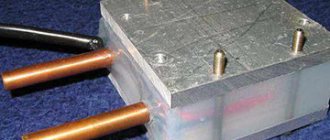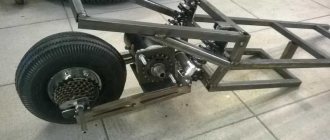Starting a car at low temperatures can sometimes be quite problematic, especially if your battery is not in its first youth. What to do if you need to leave immediately and wait until the battery is recharged from the charger, you simply don’t have time? This kind of trouble can be avoided if you have a starter charger. It is sold in auto stores, but the cost of the product is high. Therefore, many car owners who are at least a little familiar with a soldering iron and know the basics of radio engineering prefer to assemble a starter-charger with their own hands.
Types of starting devices
Having some skills in radio electronics, we assemble a starting device for a car with our own hands. We will show drawings and photos, but first we will decide on its type, since they are different. Regardless of the type, it is important for us, as users, that the PU can work without the help of a battery and starts the engine not at the limit of its capabilities, turning red and smoking, but working stably even in severe frost. This is the most important condition when choosing a ready-made charging and starting device or assembling it yourself.
There is no special pickle here. The mechanism can be one of four types:
- pulse;
- transformer;
- battery;
- capacitor.
The essence of the work of each of them ultimately comes down to supplying the on-board electrical network with a current of the required rating and voltage, 12 or 24 volts, depending on the type of electrical equipment on board.
Winding explanations
If you cannot achieve a voltage of 13-14 volts, then simply wind 10 turns on the secondary winding, measure the voltage, now divide this voltage by the number of turns in our case 10 and get the voltage of one turn, and then simply multiply how many turns are needed to achieve 13-14 volts at the output of the secondary winding of a transformer homemade starting device.
For clarity, let's look at an example:
WE wound the secondary winding with 10 turns, we measure the voltage with a multimeter, for example, we got 20 volts, but we need about 13.
This means that we take our voltage of 20 volts and divide by the number of wound turns 10 = 20/10 = 2, the number 2 is 2 volts and gives us the voltage of one turn, which means how can we achieve 13-14 volts knowing that one turn produced 2 volts.
We take the value of the voltage we need, let it be 14 volts, and divide it by the voltage of one turn 2 volts, = 14/2 = 7, the number 7 is the number of turns on the secondary winding of the car charger necessary to achieve 14 volts of output voltage.
Now let's all wind our 7 turns. And according to the diagram of the starting device for a car with your own hands, which is located above, we connect our diodes to the outputs of these turns; some car enthusiasts also use a circuit with one diode and one 12 V 60-100 watt lamp.
Actually, that’s all, then everything depends on your imagination and skillful hands!
Transformer control panel, parameters
Transformer PUs are popular among DIYers. There is probably no need to explain the principle of their operation - it is a transformer that converts network electricity to the required parameters. These devices have one disadvantage - their enormous size and weight. But they are reliable and change the output parameters of voltage and current as needed. They are quite powerful and start the engine even with a dead battery. The simplest drawing for a transformer-based starter is shown below.
Classification of starter-chargers
Despite similar functions for starting internal combustion engines, ROMs come in several types in terms of design and mechanism.
Types of ROM:
- transformer;
- battery;
- capacitor;
- pulsed.
There are also factory models, among which you need to choose ROMs that start without a battery and work stably even in severe frost.
The output of each of them produces a current of a certain value and a voltage (U) of 12 or 24 V (depending on the device model).
Transformer ROMs are the most popular due to their reliability and repairability. However, among other types there are worthy models.
Transformer type
The operating principle of transformer ROMs is very simple. The transformer converts the mains U into a reduced variable, which is rectified by a diode bridge. After the diode bridge, the direct current with pulsating amplitude components is smoothed out by a capacitor filter. After the filter, the current rating is increased using various types of amplifiers made of transistors, thyristors and other elements. The main advantages of transformer type ROM are the following:
- reliability;
- high power;
- starting the car if the battery is “dead”;
- simple device;
- regulation of U values and current strength (I).
The disadvantages are its dimensions and weight. If you can’t buy one, then you need to assemble a starting charger for the car with your own hands. The transformer type has a fairly simple device (diagram 1).
Scheme 1 - Homemade starting device for a car.
To make a starter-charger with your own hands, the circuit of which includes a transformer and a rectifier, you need to find radio components or purchase them at a specialized store. Basic requirements for a transformer:
- power (P): 1.3−1.6 kW;
- U = 12−24 V (depending on the vehicle);
- winding current II: 100−200 A (the starter consumes about 100 A when rotating the crankshaft);
- area (S) of the magnetic circuit: 37 sq. cm;
- wire diameters of windings I and II: 2 and 10 sq. mm;
- the number of turns of winding II is selected during calculation.
Diodes are selected according to reference literature. They must be designed for large I and reverse U > 50 V (D161-D250).
If it is not possible to find a powerful transformer, then the circuit of a simple car starting-charging device will have to be complicated by adding an amplifier stage using a thyristor and transistors (scheme 2).
Scheme 2 - Do-it-yourself starting and charging with a power amplifier.
The principle of operation of a ROM with an amplifier is quite simple. It must be connected to the battery terminals. If the battery charge is normal, then U does not come from the ROM. However, if the battery is discharged, then the thyristor junction opens and the electrical equipment is powered by the ROM. If U increases to 12/24 V, then the thyristors close (the device turns off). There are two types of thyristor transformer ROMs:
- full-wave;
- pavement.
With a full-wave manufacturing circuit, you need to choose a thyristor of about 80 A, and with a bridge circuit, from 160 A and above. Diodes must be selected taking into account a current from 100 to 200 A. The KT3107 transistor can be replaced with a KT361 or another analogue with the same characteristics (it can be more powerful). Resistors located in the thyristor control circuit must have a power of at least 1 W.
Boosters and capacitors
Battery-type ROMs are called boosters and represent portable batteries that operate on the principle of a portable charger unit. They are domestic and professional. The main difference is the number of built-in batteries. Household ones have a capacity sufficient to start a car with a dead battery. It can only power one unit of equipment. Professional ones have a large capacity and are used to start not one car, but several.
We also recommend reading our expert’s article, which talks about how to choose a booster to start the engine.
Capacitors have a very complex design, and, therefore, it is unprofitable to make them yourself. The main part of the circuit is the capacitor block. Such models are expensive, but they are portable ROM, capable of starting the starter even with a “dead” battery. Frequent use causes the battery to wear out very quickly if it is new. The most popular among all models were Berkut (Figure 1) with starting currents of 300, 360, 820 A. The operating principle of the device is to quickly discharge the capacitor unit and this time is enough to start the internal combustion engine.
If you compare battery and capacitor ROM, you need to take into account the features of use in a specific situation. For example, when traveling around the city, the battery type is suitable. In the event that long trips occur, then you should choose an autonomous type of ROM, namely capacitor.
Calculation example
To properly manufacture a ROM, you need to calculate it. The transformer type of device is taken as the basis. The battery current in the starting mode is Ist = 3 * Sb (Sb is the battery capacity in A*h). The operating U on the “bank” is 1.74 - 1.77 V, therefore, for 6 banks: Ub = 6 * 1.76 = 10.56 V. To calculate the power consumed by the starter, for example, for 6ST-60 with a capacitor at 60 A: Рс = Ub * I = Ub * 3 * C = 10.56 * 3 * 60 = 1,900.8 W. If you assemble the device using these parameters, you get the following:
- The work is carried out together with a standard battery.
- To start, you need to recharge the battery for 12 - 25 seconds.
- The starter spins with this device for 4 - 6 seconds. If the launch fails, you will have to repeat the procedure again. This process has a negative impact on the starter (the windings heat up significantly) and the service life of the battery.
The device should be much more powerful (Figure 1), since the transformer current is in the range of 17 - 22 A. With such consumption, U drops by 13 - 25 V, therefore, the network U = 200 V, and not 220 V.
Figure 2 - Schematic representation of the ROM.
The electrical circuit consists of a powerful transformer and a rectifier.
Based on new calculations, the ROM requires a transformer with a power of about 4 kW. With this power, the crankshaft rotation speed is ensured:
- carburetor: 35 - 55 rpm;
- diesel: 75 - 135 rpm.
To make a step-down transformer, it is advisable to use a toroidal core from an old powerful high-power electric motor. The current density in transformer windings is approximately 4 - 6 A/sq. mm. The area of the core (iron ore) is calculated by the formula: Str = a * b = 20 * 135 = 2,700 sq. mm. If another magnetic circuit is used as a basis, then you need to find examples on the Internet of calculating a transformer with this form of iron ore. To calculate the number of turns:
- T = 30/Str.
- For winding I: n1 = 220 * T = 220 * 30/27 = 244. Winded with wire with a diameter of 2.21 mm.
- For II: W2 = W3 = 16 * T = 16 * 30/27 = 18 turns of aluminum bar with S = 36 sq. mm.
After winding the transformer, you need to turn it on and measure the no-load current. Its value should be less than 3.2 A. When winding, you need to evenly distribute the turns over the area of the coil frame. If the no-load current is higher than the required value, then remove or rewind the turns on winding I. Attention: Winding II must not be touched, as this will lead to a decrease in the efficiency of the transformer.
The switch should be selected with built-in thermal protection; use only diodes rated for a current of 25 - 50 A. All connections and wires should be laid carefully. Wires should be used of a minimum length and stranded copper with a cross-section of over 100 square meters. mm. The length of the wire matters, since it may have U losses of about 2 - 3 V when the starter starts. Make the connector with the starter quick-release. In addition, in order not to confuse the polarity, you need to mark the wires (“+” is red insulating tape, and “-” is blue).
The ROM should start for 5 - 10 seconds. If powerful starters (over 2 kW) are used, then single-phase power supply will not be suitable. In this case, you need to modify the ROM for the three-phase version. In addition, it is possible to use ready-made transformers, but they must be quite powerful. Detailed calculations of a three-phase transformer can be found in reference books or on the Internet.
Devices based on switching power supplies
Another option is a pulse-type ROM (scheme 3). This device is capable of generating currents of up to 100 amperes or more (depending on the elemental base). The ROM is a switching power supply with a master oscillator on the IR2153 chip, the output of which is made in the form of an ordinary repeater based on the BD139/140 or its analogue. The switching power supply (hereinafter referred to as UPS) uses powerful transistor switches of the 20N60 type with a current of 90 A and a maximum U = 600 V. The circuit also contains a unipolar rectifier with powerful diodes.
Scheme 3 - Do-it-yourself portable starting device for a car with the ability to charge the battery.
When connected to the network through the circuit “R1 - R2 - R3 - diode bridge”, the electrolytic capacitors C1 and C2 are charged, the capacity of which is directly proportional to the power of the UPS (2 μ per 1 W). They must be designed for U = 400 V. The voltage for the pulse generator is supplied through R5, which grows over time across the capacitors and U on the microcircuit. If it reaches 11 - 13 V, then the microcircuit begins to generate pulses to control the transistors. In this case, U appears on II windings of the transformer and the composite transistor opens, power is supplied to the relay winding, which smoothly starts the starter. The relay response time is selected by the capacitor.
This ROM is equipped with protection against short circuit currents (SC) using resistors that act as fuses. During a short circuit, they open a low-power thyristor, which short-circuits the corresponding terminals of the microcircuit (it stops working). The disappearance of the short circuit is indicated by the LED that will light up. If there is no short circuit, then it will not burn.
Use of PP22 transformers
Transformers of the PP22 type are very common today. The coils in this case are used with copper winding. Their density is quite high, and they can last a long time. However, such devices still have disadvantages. First of all, it should be noted that models with the specified transformer suffer from increased output voltage. Thus, sudden surges in the network can lead to complete overheating of the capacitors.
Resistors also often fail. If the device has an indication system, the diodes will burn out due to overvoltage. It is necessary to install transformers on the model only with seals. At the same time, the toggle switch is suitable for the P2 series. In turn, indicators are often used in the IN3 class.
How to choose a transformer
To make the device yourself, it is enough to find a suitable transformer, and for a reliable start it must produce at least 100 A and a voltage of 12 V, if we are talking about a passenger car. If you ask a fifth grader, he will be able to calculate the power. In our case, it is 1.2, or better yet 1.4 kW. Without a battery, it will hardly be possible to start the engine with such current, because the starter needs at least 200 A. A standard battery will help spin the crankshaft, and while rotating, the starter consumes no more than 100 A, which is what our device will produce.
The core area cannot be less than 37 cm², and the primary winding wire must be at least 2 mm². The secondary is wound with copper wire with a cross-section of 10 squares, and the number of turns is selected experimentally so that the open circuit voltage is no more than 13.9V.
Diagram and details of PU assembly
Calculating the parameters of a transformer is not all. The device works like this. We connect the power wires directly to the battery terminals, while there is no voltage at the output of the control unit until the battery voltage drops below the response threshold of the thyristors, which are indicated in the diagram. As soon as the voltage at the battery terminals drops, the thyristors open the input and only then the electrical equipment is powered by the device. As soon as the voltage at the battery terminals rises to 12 V, the thyristors close and the device automatically turns off. This allows you to save the battery from overload.
The thyristor version can be assembled using two methods - using a full-wave circuit and using a bridge circuit. If the rectifier is a bridge rectifier, then the thyristors must be selected twice as powerful. That is, according to the first scheme, thyristors are rated at a minimum of 80 A, and with a bridge circuit - at least 160 A. Diodes are rated for a current of at least 100 A. These elements are easily recognized by their braided output tip. The KT3107 transistor can be replaced with the 361st. There is only one requirement for resistance in the control circuit - their power must be at least one Watt.
The output wires, naturally, must correspond to the current and, as a rule, for this they take an analogue from a welding machine. Naturally, they are no thinner than the secondary wire. The wire that connects the network has a cross-section of each core of at least 2.5 square millimeters. A simple and reliable assembly that will start the engine in any frost. However, there are other options that you can buy in the store.
What parameters should a starter-charger have?
In order for the power unit to be guaranteed to start, it is necessary to calculate the parameters of the structural components used. At the output, the ROM must provide a current of at least 100 A, that is, power P = 1200 W. But there must be a reserve. Therefore, the output U = 14–16 V. It is worth noting that these are the minimum parameters with which the engine can be started, provided that the battery is at least a little bit still alive. The fact is that the starter requires energy up to 200 A at a time, and some of it is supplied by the battery. When the crankshaft begins to turn, the amount of current consumed drops by about half.
Video “How to build an adjustable ROM”
User valeriyvalki spoke in detail about the procedure for assembling an adjustable ROM with a description of all the features and components that were used for development.
The battery is a faithful friend and assistant in the most difficult situations, but, unfortunately, it does not last forever. It would be okay if the battery died instantly, without hope of recovery. But it gradually loses its characteristics, so it often turns out that it is simply impossible to turn the starter. The peak of battery failure occurs in winter, when it is especially difficult for equipment to start in cold weather. And then either a neighbor in the garage comes to the rescue with wires for lighting, or a spare battery. Or a good starting device, which every thrifty car enthusiast has.
Selecting a simple transformer-based circuit
ROMs of any type perform the same task - they help start the car. However, when assembling a starting charger for a car with your own hands or buying it, it is worth remembering that there are several varieties of internal electronic filling:
- working on a transformer;
- delivering energy from a special separate battery (boosters);
- capacitor type;
- pulsed.
Since we are talking about the simplest ROMs that you can assemble with your own hands, we will further consider the first type of circuits listed above.
General information
Starting an internal combustion engine (ICE) in the cold season is a big problem.
In addition, in the summer when the battery is dead, this is quite a difficult task. The cause is the battery. Its capacity depends on the service life and viscosity of the electrolyte. The condition or consistency of the electrolyte depends on the ambient temperature. Additionally, we recommend reading our specialist’s article on how to start a car in cold weather.
At low temperatures, it thickens and the chemical reactions necessary to power the starter slow down (the current decreases). Batteries very often fail in winter, since it is very difficult for the car to start, and more current is consumed than in the summer. To solve this problem, car starter-chargers (RODs) are used.
Don’t know how to make a winch from a starter with your own hands? Be sure to read the detailed and very interesting material from our expert.
We also recommend reading our specialist’s article, which describes in detail how to repair the starter yourself.
Description and principle of operation of the starter-charger
There is nothing particularly complicated here. Mains U = 220 V is supplied through a switch to the primary winding of the transformer, and the alternating voltage is reduced on the secondary winding. Then it is smoothed out by a full-wave or bridge rectifier assembled using powerful diodes. The ripple voltage can then be filtered using electrolytic capacitors. If necessary, the voltage near the output is increased, which is done with the help of amplifiers, in which the main components are transistors and thyristors.
Among the disadvantages of the described starting-charger, one can note only its considerable weight, which is due to the installation of a powerful and, as a consequence, oversized transformer. Below is a diagram of a do-it-yourself full-wave starting-charger:
This circuit uses a laboratory transformer LATR. Instead of two diodes, you can also use a diode bridge of the KTs405 type. Starter-charger circuit for a car with an amplifier:
How to make a starter-charger with your own hands so that it will definitely work? Part parameters must be observed. The power of the thyristors shown in the picture is at least 80 A (if a diode bridge is used, then from 160 A). Diodes for current - 100–200 A. Transistor - KT361 or KT 3102 (any other with the same parameters can be used). The power of the resistors used is from 1 W.
A self-assembled charger and starting device is connected via alligator clips to the battery in accordance with the polarity. With a normally charged battery with ROM, no energy will be supplied. If the battery is not functioning, the thyristor junction will open, and the charging current will go to the battery and starter.
Calculation of transformer windings
First you need to select a magnetic core, the cross-section of which must be at least 37 square meters. cm. To calculate the number of turns in the primary winding, you need to use the formulas: T = 30/S, where S is the area of the magnetic circuit and N = 220*T, that is, W1 = 220*30/37 = 178 turns. For winding, it is necessary to use an insulated wire with a cross-section of at least 2 square meters. mm. Formula for the secondary winding: W2 = 16*T = 16*30/37 = 13 turns. Here you will need an aluminum tire with an area of 36 square meters. mm.
It is worth noting that formulas may not always give the exact number of windings (especially the secondary), so you can use the selection method. Having wound the primary winding, wind a few turns of the secondary and measure the resulting voltage without cutting the bus. Thus, you need to achieve a value of 14–16 V at the output.
Things will be easier if you have an LATR - laboratory transformer. You need to take the core from it. The number of turns of the primary winding is 265–295. Use 2mm insulated wire. Winding is done in three layers. Next, be sure to check the value of the no-load current (connect the multimeter to the gap between the 220 V network and one of the ends of the winding). The device should show 210–390 mA. If the readings are higher, the number of turns must be increased, otherwise, on the contrary, reduced. The secondary winding is divided into two sections, each with 15–18 turns. Here you will need a wire with a cross section of 10 square meters. mm.
Replacing the secondary winding of the transformer
First, using a chisel and hammer, you need to remove the secondary winding and its frame. Clean the edges of the windows from burrs with a file. Insulate the transformer rod, especially the corners, with a plastic plate. For the secondary winding it is necessary to have an insulated stranded copper wire with a cross-section of 10mm2. To obtain an output voltage in idle mode of 15V, it is necessary to wind seventeen turns, which corresponds to a wire length of about four meters. It is very difficult to place such a number of turns due to the large outer diameter of the conductor - 6.2 mm. To reduce the outer diameter of the wire, it is necessary to remove the insulation. Simply use a blade to cut through the insulation along the entire wire, and then peel off the insulation piece by piece and begin to insulate it in one layer with acetate fabric insulating tape. Now we have a new elastic wire with an outer diameter of 4.5mm. It is also necessary to prepare plastic spacers with a thickness of no more than 0.2 mm from various packaging containers, which must be placed between the layers during winding only inside the transformer window. It won’t hurt if you prepare in advance several wooden strips of different thicknesses to fix the turns while winding. After such preparation, you can begin winding the secondary winding. Once the desired number of turns have been placed, do not remove the remainder of the wire. Check the voltage at the winding terminals. The fact is that the parameters of the transformer may be different and depend on the number of welds.
Starter elements layout
The rectifier filter consists of a set of capacitors with a capacity of 2200 microns x 25V. Under no circumstances should you install one 10,000 micron capacitor with regular leads intended for printed circuit boards. The conclusions will simply become red hot, etc. You need to use a container whose terminals are designed for bolts. Such capacitors are quite expensive.
Supporting elements are needed only for ease of installation of diodes and the switch. The chassis consists of two layers: on the first layer of 2.5mm thick fiberglass laminate all components are installed, the second layer of laminite hides all the protrusions of the fasteners. After installing the rectifier, filter and transformer, we mount all this on the device niche and secure it with the screws that secure the rubber reinforcements. We carry out final installation.
Rectifier calculation
The following describes the parameters of electronic components (in addition to those indicated above) used in both circuits:
- Diodes. The maximum transmitted current should not be less than 100 A. These can be V200, D141, 2D141, 2D151 and other similar parts. Instead of KD105, it is not forbidden to use KD209 or even D226. Zener diode - D808, 2S182, etc.
- Thyristors. I = 80 A or more: TC185, T15-80, T15-100, T161, T125, etc. If the current rectification option with a diode bridge is used, the thyristors will be doubly powerful: T15, T160, T250, T16 and others, similar .
- Transistors. The gain factor h = 21e is important here. This is KT361 or KT3107 with npn conductivity. Instead of KT816, KT814 is also suitable.
- Resistors. It is desirable that their power be at least 1 W.
- Switch. Must keep current from 6 A.
Selection of wire cross-section
When selecting output wires that will be connected to the battery, you need to remember that their diameter cannot be less than the same parameter of the secondary winding. It is better to use a stranded copper cable used in welding machines, where each wire has a cross-section of 2.5 square meters. mm. The wire through which the homemade device will connect to the network must have the same area. Don't forget to purchase powerful alligator clips for connecting to the battery terminals. Here, too, it is recommended to use products used for welding (“mass”).
Charging the battery from the computer power supply
To charge any battery, 5-6 ampere hours is enough, this is about 10% of the capacity of the entire battery. Any power supply with a capacity of 150 W or more can produce it.
So, let's look at 2 ways to make your own charger from a computer power supply.
Method one
For manufacturing you need the following parts:
- power supply, power from 150 W;
- resistor 27 kOhm;
- current regulator R10 or resistor block;
- wires from 1 meter long with terminals;
Work progress:
- First we need to disassemble the power supply.
- We remove the wires we are not using, namely -5v, +5v, -12v and +12v.
- We replace resistor R1 with a pre-prepared 27 kOhm resistor.
- We remove wires 14 and 15, and simply disconnect 16.
- From the unit we take out the power cord and wires to the battery.
- Install the current regulator R10. In the absence of such a regulator, you can make a homemade resistor block. It will consist of two 5 W resistors, which will be connected in parallel.
- To configure the charger, install a variable resistor in the board.
- We solder wires to outputs 1,14,15,16, and use a resistor to set the voltage to 13.8-14.5V.
- We attach terminals to the ends of the wires.
- We delete the remaining unnecessary tracks.
Important: adhere to the complete instructions, the slightest deviation can lead to burnout of the device.
Method two
To manufacture our device using this method, you will need a slightly more powerful power supply, namely 350 W. Since it can output 12-14 amps which will satisfy our needs.
Work progress:
- In computer power supplies, the pulse transformer has several windings, one of them is 12V, and the second is 5V. To make our device, you only need a 12V winding.
- To start our unit you will need to find the green wire and connect it to the black wire. If you use a cheap Chinese unit, there may be a gray wire instead of a green one.
- If you have an older power supply with a power button, the above procedure is not necessary.
- Next, we make 2 thick busbars from the yellow and black wires, and cut off the unnecessary wires. A black tire will be a minus, a yellow one will be a plus.
- To increase the reliability of our device, we can swap diodes. The fact is that the 5V bus has a more powerful diode than the 12V.
- Since the power supply has a built-in fan, it is not afraid of overheating.
Method three
For manufacturing we will need the following parts:
- power supply, power 230 W;
- board with TL 431 chip;
- resistor 2.7 kOhm;
- resistor 200 Ohm power 2 W;
- 68 Ohm resistor with a power of 0.5 W;
- resistor 0.47 Ohm power 1 W;
- 4-pin relay;
- 2 diodes 1N4007 or similar diodes;
- resistor 1kOhm;
- bright LED;
- wire length of at least 1 meter and cross-section of at least 2.5 mm 2, with terminals;
Work progress:
- We solder all the wires except 4 black and 2 yellow wires, since they supply power.
- Close the contacts responsible for overvoltage protection with a jumper so that our power supply does not turn off due to overvoltage.
- We replace the built-in resistor on the board with the TL 431 chip with a 2.7 kOhm resistor to set the output voltage to 14.4 V.
- We add a 200 Ohm resistor with a power of 2 W to the output from the 12V channel to stabilize the voltage.
- We add a 68 Ohm resistor with a power of 0.5 W to the output from the 5V channel to stabilize the voltage.
- We solder the transistor on the board with the TL 431 chip to eliminate obstacles when setting the voltage.
- We replace the standard resistor in the primary circuit of the transformer winding with a 0.47 Ohm resistor with a power of 1 W.
- We are assembling a protection circuit against incorrect connection to the battery.
- We remove unnecessary parts from the power supply.
- We remove the necessary wires from the power supply.
- Solder the terminals to the wires.
For ease of use of the charger, connect an ammeter.
The advantage of such a homemade device is the inability to recharge the battery.
Description and principle of operation of the starter-charger
There is nothing particularly complicated here. Mains U = 220 V is supplied through a switch to the primary winding of the transformer, and the alternating voltage is reduced on the secondary winding. Then it is smoothed out by a full-wave or bridge rectifier assembled using powerful diodes. The ripple voltage can then be filtered using electrolytic capacitors. If necessary, the voltage near the output is increased, which is done with the help of amplifiers, in which the main components are transistors and thyristors.
Among the disadvantages of the described starting-charger, one can note only its considerable weight, which is due to the installation of a powerful and, as a consequence, oversized transformer. Below is a diagram of a do-it-yourself full-wave starting-charger:
This circuit uses a laboratory transformer LATR. Instead of two diodes, you can also use a diode bridge of the KTs405 type. Starter-charger circuit for a car with an amplifier:
Mobile control units
Another type of PU, or rather two at once, similar in principle of operation - battery and capacitor. A capacitor device works by discharging charged capacitors upon command. Their composition cannot be called particularly complex, but capacitors of such ratings themselves are quite expensive and cannot be restored after damage or drying out. They are used very rarely, although they are quite mobile, but due to high unregulated currents there is a risk of harming the battery.
Boosters, or battery starters, work even simpler. By and large, this is just an additional battery in a self-contained case. It was their autonomy that brought them popularity. They can be used even in the steppe, where there is no electricity. The pre-charged battery is connected to the on-board power supply and quietly starts the engine. In this case, it is important to choose the booster capacity and its starting current. It cannot be less than that of a standard battery. Household autonomous units have a capacity of 18 A/h, while more expensive and bulky, professional devices can have a capacity of about 200 A/h.
Any of these driver assistants will help start the engine, but there is nothing more reliable and cheaper than a transformer PU assembled by yourself. Good luck to everyone and have a quick start!
Built-in controller
Thanks to technological progress, the comfort of servicing and driving a car increases. Many modern cars are equipped with on-board computers. One of its functions is to display battery voltage. But such luxury is not available to all drivers. Older models sometimes have an analog voltmeter installed, but it is difficult to judge the charging status from its readings. Therefore, they began to produce special batteries. They are available either built into the battery or as separate devices that connect to the on-board computer.
Batteries are usually equipped with built-in indicators. They are float indicators, often called hydrometers. By their color you can determine the degree of charge of the battery and the electrolyte level. To monitor the battery condition, a single cell indication is sufficient. Before using the indicator, you should lightly tap it. This is necessary to remove air bubbles that may interfere with observations. This way you can clearly see the color of the indicator.
When analyzing, it should be taken into account that when the battery begins to charge, the density of the electrolyte increases closer to the electrodes. Above the electrodes, the increase in density occurs due to diffusion. The indicator is located above the electrodes and will react accordingly to the density in this part of the battery. This may cause inaccurate results.
Even when fully charged, the indicator may remain black. This situation is explained by the fact that the electrolyte layers of higher density did not have time to mix with layers of lower density. The diffusion process can last several days.
The built-in indicator circuit looks like this:
Battery hydrometer design
Disadvantages and advantages of simple homemade starter-chargers
The main advantages of transformer ROM:
- ease of assembly and high reliability;
- power;
- the possibility of using used parts, which significantly reduces the cost of the design;
- starting the engine with an almost “dead” battery;
- low price: even if all the elements are purchased in a store, the cost of a homemade ROM will be several times less than the factory one.
What about the downsides? First of all, we can call it a large mass. However, this is not critical: it is unlikely that anyone will carry this device with them - its place is in the garage, in a “hospital”.
There is another negative side: in the simplest circuits of starting-chargers for car batteries, there is no protection against short circuits, overloads, or polarity reversals, which can lead to failure of both the ROM itself and the car’s electronics. The lack of control instruments - ammeter, voltmeter - also has a bad effect on the operation of the simplest ROMs.
Another disadvantage: more complex charging and starting circuits for car batteries are beyond the capabilities of a person familiar with the basics of radio engineering. Also, the device will not fully function if the network is significantly less than 220 V, and this is not at all uncommon in rural areas. The problem can be solved by using a stabilizer.
Helpful advice
When using devices without automatic battery charge control, you can use the simplest network, daily relay made in China. This will eliminate the need to monitor the time the unit is disconnected from the network.
The cost of such a device is about 200 rubles. Knowing the approximate charging time of your battery, you can set the desired shutdown time. This ensures that the electricity supply is cut off in a timely manner. You can get distracted by business and forget about the battery, which can lead to boiling, destruction of the plates and failure of the battery. A new battery will cost much more
What should you consider when choosing a ROM?
Despite the fact that over a period of time a certain rating of starter-charger models has been formed, which can be found below, the most popular and popular model is not always suitable in each specific case. When purchasing a device, you need to base it on your needs, situation and capabilities. To choose the most suitable ROM, you need to consider several basic characteristics, which are described in detail below.
Maximum starting current
One of the most important parameters that you need to pay attention to when choosing a starting charger is the magnitude of the starting current. This indicator is measured in amperes and shows the amount of charge that is transferred to the battery when using the device.
To choose the most suitable model, you need to start from the engine size of the car for which you are purchasing the device. For small cars, a device with a starting current of up to 200 amperes is sufficient. If the engine is larger, then it is better to give preference to a ROM with a starting current of 300 amperes.
Support voltage
As for the output voltage indicator, it is recommended to purchase a device with this indicator of 19 Volts. Despite the fact that the vehicle's on-board network operates at a voltage of 12 volts, in the case where it is impossible to start the engine due to a discharged battery, a higher voltage will be required, even when starting the engine normally.
Dimensions and weight
Such parameters of the ROM depend on the further conditions of its operation. If a car enthusiast has a garage and there is no need to have the device with him all the time, then it is better to purchase a more powerful ROM, which can weigh on average 20 kg.
If a car enthusiast does not use a garage, but leaves his car in the parking lot and prefers to have the ROM with him, then the best option is to purchase a lighter and more portable device, the weight of which does not exceed 10 kg, and the width and height are 20 and 40 cm, respectively.
Additional options and features
Regarding various additional functions, it would not be a bad idea to purchase a device equipped with various protection systems, for example, if the car owner mixed up the terminals when connecting the device to the car’s on-board network.
It is also worth giving preference to devices that allow you to regulate current and voltage indicators. Using this function, you can independently select the required value depending on the situation and the condition of the battery.
When purchasing, you should pay attention to the material from which the device body is made. It is better to give preference to devices with a metal body or made of high-strength plastic
Such models can last for a long time.
Selection by technical indicators
When you come to the store to buy a starter-charger, you need to take into account some factors.
First, what kind of battery this device will have to work with. There are several types of batteries and each type has its own charging characteristics.
Therefore, before going to the store, it is worth checking which battery is installed in the car. If it is an acid battery, then the charger must be designed to work with this type of battery.
The next thing to consider is what output voltage the device should have.
If only with passenger cars, then 12 V
.
But there is one interesting fact here: these devices can remain operational for a very long time. And it is quite possible that the car will change over time and a device with an output voltage of 24 V
.
Therefore, the best option would be to purchase this device, which can operate in the range of 6-24 V; this will not be superfluous.
The next factor influencing the choice of ROM is the current strength that the device must produce to start the car.
To determine this parameter, it is worth looking at the technical characteristics of the car, in particular the current required to start the car.
If this is not possible, the approximate value of this parameter can be found on the battery installed in the car.
For example, if the battery indicates that its capacity is 65 Ah
, then the ZPU should be selected with such an output current value.
But again, it is worth taking into account the fact that the car may change and this value on the car will be higher and the ZPU
with a value of
65 Ah
will no longer be able to start the car.
Therefore, it is advised that when choosing a starting charger, this factor should also be taken into account, since the purchased device, which will operate at the limit value, will fail faster due to operation at the limit value. Therefore, the current strength of the purchased device at startup must be higher than required.
In addition to the current strength for starting, it is worth taking into account the current strength of the device that is needed to charge the battery.
If the output current in charging mode is less than what is required for the battery, this will lead to rapid drainage of the battery due to systematic undercharging.
Selecting a charger based on the charging current is not so difficult. The fact is that the optimal current value for charging a battery is 10% of the rated power of the battery. That is, if the battery capacity is 65 Ah
, then the current that should be at the output should be
6.5
A. And again, it is worth considering that the device should not operate at maximum values, it should have a reserve.
It is also worth paying attention to the new ROM AvtoGSM Energy D09, which is suitable for all occasions











